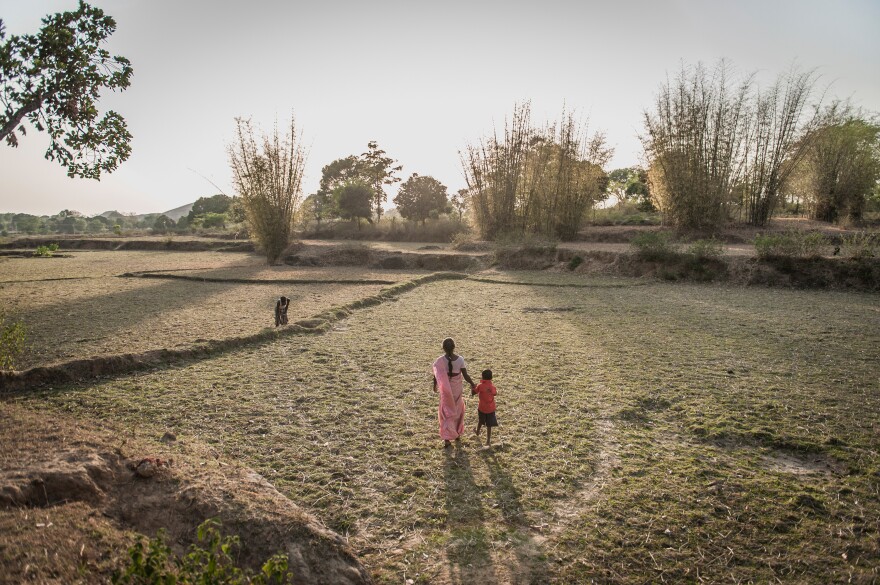One day in the summer of 2013, 25-year-old Seteng Horo found herself on a bus to the nearest public hospital, about four hours away from her remote village in the eastern Indian state of Jharkhand. It's not a trip she can afford to take often — buses are infrequent, the journey is long and the cost of about a dollar roundtrip is not insignificant. But she had no choice. She was running a temperature and had been bleeding for days. The reason: an unsafe abortion performed by a village midwife.
Horo's story is not uncommon in India. An estimated two-thirds of abortions performed are unsafe, done illegally at home or by quacks and midwives, and the annual death toll is about 4,600. Many women end up with life-long health problems. And women in rural India are disproportionately affected.
And yet, abortion has been legal in India since 1971.
"That's the irony of the situation," says Vinoj Manning, the director of the India office of IPAS, an international nonprofit organization that works to increase access to safe abortions.
The Indian public health system has failed to provide any abortion services to poor women in rural areas, he says. "All good [health] care is concentrated in urban centers" — and is not affordable by India's poor.
When Seteng Horo, a mother of two, became pregnant last year, she and her husband decided to terminate her pregnancy. "I don't want more kids," she says. "My husband doesn't either." Raising two children was expensive enough, she says.
But they had few options for an abortion. Her village, Serotoli, doesn't even have a public health clinic or hospital, and they are too poor to afford private health care. Besides, Horo had no idea that abortion is legal and that she should only undergo the procedure at a facility certified by the government.
Horo first went to what is known in these parts as a jhola wala doctor, a doctor with a bag. They're men who travel from village to village with a bagful of medicines. But they aren't qualified doctors. Some are trained in alternative medicine but have little or no understanding of modern medical science. Others have no medical training at all. They are basically quacks.
The jhola wala doctor gave her an expensive pill that didn't work. Then, she went to a daai, an elderly woman in her village who serves as both a midwife and traditional healer, especially for women's reproductive health. A daai is an important figure in India's villages, at once a medicine woman and a confidante and adviser on matters of reproductive health.
Abortion, like all matters related to sex, is a taboo. "Anything about sex and sexuality is stigmatized," says Manning. "We don't even talk about it in our own homes. And when it comes to abortion, it is even more stigmatized" — because a woman's primary role is still seen as a child bearer. This creates a culture of silence around the topic, he says. And women prefer to go to a daai knowing she will keep the abortion confidential.

Horo's daai gave her an abdominal massage, a commonly used abortion practice in the region. The massage, usually done with hot oil and plant leaves is intended to destroy the fetus. "At first I thought it worked," says Horo. Days later, she was feverish and bleeding profusely. It was only then that she decided to take the 60-mile bus ride to the nearest public hospital. But like most public hospitals and health clinics in rural India, this one did not have a doctor trained to perform an abortion.
The hospital referred her to a small clinic nearby, in Khunti, run by the Family Planning Association of India (FPAI), a nonprofit organization that provides reproductive health services at little or no cost to the poor.
As more people have learned about the clinic in the four years since it opened, Dr. Mahesh has seen the number of patients grow. The clinic currently performs an average of 50 abortions every month, she says. "They come from very far-flung areas," she says. There are two other clinics elsewhere in Jharkhand and others around the country. But they probably don't reach as many women as they should, says the doctor.
The government of India recognizes the problem and is trying to solve it. This year, it took steps to train more providers in government hospitals. It also launched a media campaign to raise people's awareness.
In addition, the government is trying to amend the law so that trained nurses can perform abortions, and not just certified doctors. This will increase access to safe abortion, especially in poor and rural communities.

"What they're trying to do is move abortion from informal backstreet culture to a mainstream one, and to bring abortion closer to communities," says Manning. As for changing the culture of silence around abortion, "that's will probably take a long time to address," he says.
Those practitioners have another role to play. When I met Horo earlier this year at the clinic in Khunti, she had come for a second abortion. "I'll come here again and again if I have to," she said.
But she may no longer need to contemplate ending an unwanted pregnancy. Until she came to the clinic, Horo had no easy way to obtain birth control pills. Now she relies on the clinic for birth control and recently got a contraceptive injection.
Copyright 2021 NPR. To see more, visit https://www.npr.org.


